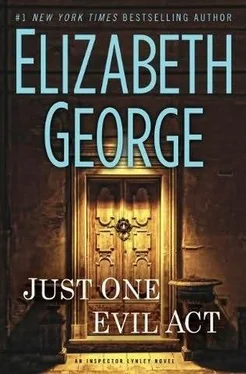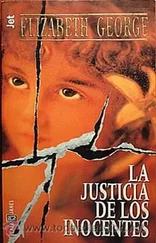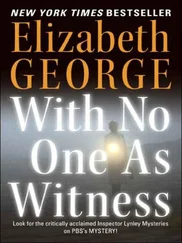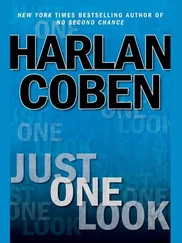Daidre hesitated. She looked from Lynley to Barbara. An Amazonian woman approached and asked them all if they were coming to tipple a few at the pub where someone called McQueen was waiting to challenge Daidre at darts again. Her moment of escape was at hand, but Daidre didn’t grasp at it. She said—her gaze flickering to the woman and then back to Lynley—that she would have to beg off. Her friends, she said, were insisting . . . if Lisa would make her excuses? Lisa tossed a knowing look Lynley’s way. Right, she said. Stay safe, not sorry.
Barbara wondered if she was supposed to leg it, now that Daidre’s presence in Lynley’s home was assured, but he made it clear that she was to do nothing of the sort. Besides, she’d left her Mini blocking his garage in a mews round the corner from his digs, so one way or another she was going to have to get to it in order to scarper.
On the way to Belgravia, they made polite conversation in the manner of their countrymen: They talked about the weather. After that, Daidre and Lynley went on to speak of gorillas, for a reason that Barbara couldn’t suss out. Some female gorilla was happily pregnant. On the other hand, something was wrong with the right front foot of one of the elephants. Negotiations were ongoing for a visit from some pandas, and Berlin Zoo still wished to get its hands on a polar bear cub born early last year. Was that difficult, Lynley wanted to know, breeding polar bears in captivity? It was always difficult breeding in captivity, Daidre told him. Then she fell silent, as if she’d accidentally spoken a double entendre.
At Lynley’s house, they parked in the mews. Since Barbara had to move her car to allow Lynley access to his garage, she made noises as if to leave them then. Lynley said, “Don’t be ridiculous, Barbara. I know you’re dying for a meal,” and he shot her a look whose meaning she couldn’t fail to read: She was not to desert him in his hour of need.
Barbara hadn’t a clue how she was supposed to facilitate matters for Lynley. She knew Daidre Trahair’s background. She knew how unlikely it was that the veterinarian would allow things—whatever they were at present—to progress with Lynley. Through no fault of his own, the poor bloke had a title, an ancestral line stretching back to the Domesday Book, and a gargantuan family pile in Cornwall. Sitting at a table laid out with sixteen pieces of silver cutlery, he would know innately which fork to use when and why there were additional spoons and whatevers at the top of his plate, along with those on each side of it. For her part, Daidre’s family probably still ate with knives and their fingers. The niceties of life where she was from did not extend to place settings of heirloom china and a line of wineglasses to the right of one’s dinner plate.
Luckily, Lynley had thought of all this, Barbara saw. Inside the house and laid out in the dining room—although it was a bit of a problem that the bloke actually had a dining room—were three settings of plain white crockery, and the cutlery had handles that looked like Bakelite. Probably purchased for this exact moment, Barbara thought sardonically. She’d seen his regular stuff. It hadn’t been purchased at the local Conran Shop.
The meal itself was simple. Anyone could have put it together, and although Barbara would have laid easy money on that anyone not being Thomas Lynley, she went along with the pretence that he’d actually stood over a hob stirring the soup and had worn an apron over his bespoke suit while he tossed the salad. Even followed a recipe to make the quiche, she decided. What he’d actually done, of course, was hoof it down to Partridges on the King’s Road. If Daidre knew this, though, she didn’t let on.
“Where’s Charlie?” Barbara asked as she and Daidre stood uselessly by with wineglasses clasped in their hands as Lynley went to and from the kitchen.
Charlie Denton had decamped to Hampstead for the day, Lynley told them, attending a matinee production of The Iceman Cometh . But “Back any time now,” he assured them heartily. Daidre was not to feel ill at ease that he might leap upon her should Barbara leave them.
Which was what she did as soon as she could. Lynley was guiding them into the drawing room for postprandial drinks when Barbara decided that she’d done her duty by her superior officer and it was time to go home. Early hours yet, she declared airily, but there you had it. There was something about roller derby, you know. She was knackered.
She saw Daidre wandering to the table between the two front windows. On it stood a silver-framed picture of Lynley and his wife on their wedding day. Barbara glanced at him and wondered why he hadn’t removed it prior to bringing Daidre into his home. He’d thought of everything, but he hadn’t thought of this.
Daidre picked up the picture as anyone might have done. Barbara and Lynley exchanged a look. Before Daidre could turn and mention the picture—the obvious comment being one about how lovely a woman Helen Lynley had been—Barbara said expansively, “So I’ll say an early good-night, sir. And thanks for the meal. Got to dash before I become a pumpkin.” She added, “Or whatever,” when she realised that her Mini would turn into the pumpkin and not herself. She’d never been good with allusions to fairy tales.
Daidre said, “I should go as well, Thomas. Perhaps Barbara can drop me at my hotel?”
Another look between Lynley and Barbara, but he jumped in before she had to come up with the reason on her own. “Nonsense,” he said. “I’m happy to drive you. Whenever you’re ready.”
“Take him up on that,” Barbara told her. “It’d take me till morning to clear the takeaway cartons from the passenger seat of my heap.”
That said, she got herself out of the town house. The last thing she saw was Lynley pouring brandy into two crystal balloons. Whoops on that one, she thought. He should have used teacups or something. Supper within a bona fide dining room had been bad enough.
She quite liked the vet, but she wondered about Lynley’s pursuit of her. There was definitely a kind of tension between them. It just didn’t seem sexual to Barbara.
No matter, she thought. It wasn’t her affair. As long as Lynley didn’t ensnare himself with Isabelle Ardery again, anyone else was fine by her. For his time with Isabelle had constituted the malodorous dead elephant. She was that happy the rotting corpse of it had finally been removed from the room.
She was thinking of nothing in particular when she saw the panda car in front of the yellow Edwardian villa when she arrived home. It was double-parked in the street next to an ancient Saab, and in the evening light, most of the inhabitants of the building behind which Barbara’s tiny bungalow sat stood along the driveway in clusters, as if waiting to see someone brought outside in handcuffs. Barbara parked hastily and illegally. She got out and heard someone saying, “Don’t know . . . Didn’t hear a thing till the cops showed up,” and she made fast time to join the onlookers.
“What’s going on?” She addressed her question to Mrs. Silver, who lived in a flat on the second floor of the house. She was wearing, as always, one of her pinafore aprons and an accompanying turban, and she was chewing nervously on what looked like a tongue depressor bearing chocolate stains.
“She’s phoned the police,” Mrs. Silver said. “Or someone has. Maybe he did it. There was shouting at first. All of us heard it. Both of them. Another man as well. Not an English speaker, him. He was shouting in I-don’t-know-what language. I couldn’t tell. Well, it’s my hearing, isn’t it? But it doesn’t matter. They must have been heard all the way to Chalk Farm Road.”
This was shorthand for something. What it was Barbara didn’t know. She looked round to see who else was in the crowd, but what she noticed was who wasn’t there. And then her gaze went to the villa itself, where every light appeared inside of the ground-floor flat and the French windows were standing open.
Читать дальше












